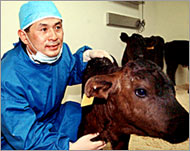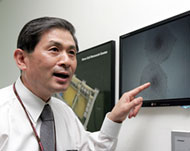Shamed Korean stem cell expert quits
Hwang Woo-suk, the pioneering South Korean stem cell researcher, has apologised and resigned from his university after he was found to have fabricated much of his work.

“I sincerely apologise to the people for creating a shock and disappointment,” Professor Hwang said as he was leaving his office at Seoul National University, considered the country’s top institution of higher learning.
“With an apologising heart … I step down as professor.”
However, Hwang still maintained that he had produced the technology to create patient-matched stem cells as he claimed to do in an article in the journal Science in May.
“I emphasise that patient-specific stem cells belong to South Korea and you are going to see this,” Hwang said.
Earlier on Friday, a panel of Seoul National University scientists said Hwang had faked results of at least nine of 11 stem cell lines he claimed to have created in the May paper, the first confirmation of allegations that have cast a shadow over all his purported breakthroughs in cloning and stem-cell technology.
Science credibility
The panel accused Hwang of damaging the scientific community with his deception, while South Korea’s government rued the scandal surrounding the country’s star scientist and said it may pull its funding for his research.
“This kind of error is a grave act that damages the foundation of science,” the panel said.
|
“I sincerely apologise to the people for creating a shock and disappointment” Professor Hwang |
The South Korean government, which had strongly supported Hwang and designated him the country’s first “top scientist”, said on Friday it was “miserable” over the reported results of the investigation and admitted errors in its handling of Hwang.
Choi Sung-sik, vice minister of science and technology, said it was impossible to recover money already spent for Hwang, a total $39.9 million for research and facilities since 1998.
But his ministry will consider ending other funding and withdraw the “top scientist” designation. Still, the government said it would support other similar research.
The university panel said on Friday it found that “the laboratory data for 11 stem cell lines that were reported in the 2005 paper were all data made using two stem cell lines in total”.
The panel’s report is the first confirmation of allegations that have cast a shadow over his entire list of breakthroughs in cloning and stem-cell technology.
Scientific claims
In his paper in Science, Hwang claimed to have created 11 stem-cell lines matched to patients in an achievement that raised hopes of creating tailored therapies for hard-to-treat diseases.
 |
|
Hwang pictured in 2003 with a |
But one of his former collaborators said last week that nine of the 11 lines were faked, prompting reviews by the journal and an expert panel at Seoul National University.
The panel said on Friday it found that “the laboratory data for 11 stem cell lines that were reported in the 2005 paper were all data made using two stem cell lines in total”.
To create fake DNA results purporting to show a match, Hwang’s team split cells from one patient into two test tubes for the analysis, rather than match cloned cells to a patient’s original cells, the university said.
“Based on these facts, the data in the 2005 Science paper cannot be some error from a simple mistake, but cannot be but seen as a deliberate fabrication to make it look like 11 stem-cell lines using results from just two,” the panel said.
Other investigations
The panel said DNA tests expected to be completed within a few days would confirm if the remaining two lines it had found were successfully cloned from a patient.
|
“This kind of error is a grave act that damages the foundation of science” |
In light of the revelations, the panel said it would investigate Hwang’s other landmark papers, which include another Science article in 2004 on the world’s first cloned human embryos, and an August 2005 paper in the journal Nature on the first cloned dog.
The journals are already reviewing the work.
Hwang, a veterinarian, had maintained that his science was sound and that tests would prove his case.
Errors
However, he admitted last week to “fatal errors” in the May report and asked Science to withdraw the paper.
 |
|
Hwang admitted to fatal errors |
He acknowledged that at the time of publication, his team had created only eight cell lines. But he said three more were created later.
Hwang has enjoyed strong government support. Earlier this year he was designated South Korea’s first “top scientist” and was given special funding.
The government had stood by Hwang when he admitted to ethics violations last month for using eggs from workers in his lab in research.
Hwang’s article this year had been viewed as significant for his efficiency in cloning the stem-cell lines, claiming to use just 185 human eggs to create custom-made embryonic stem cells for the 11 patients.
But Roe said the investigation had “found that there have been a lot more eggs used than were reported” and were investigating the exact number.